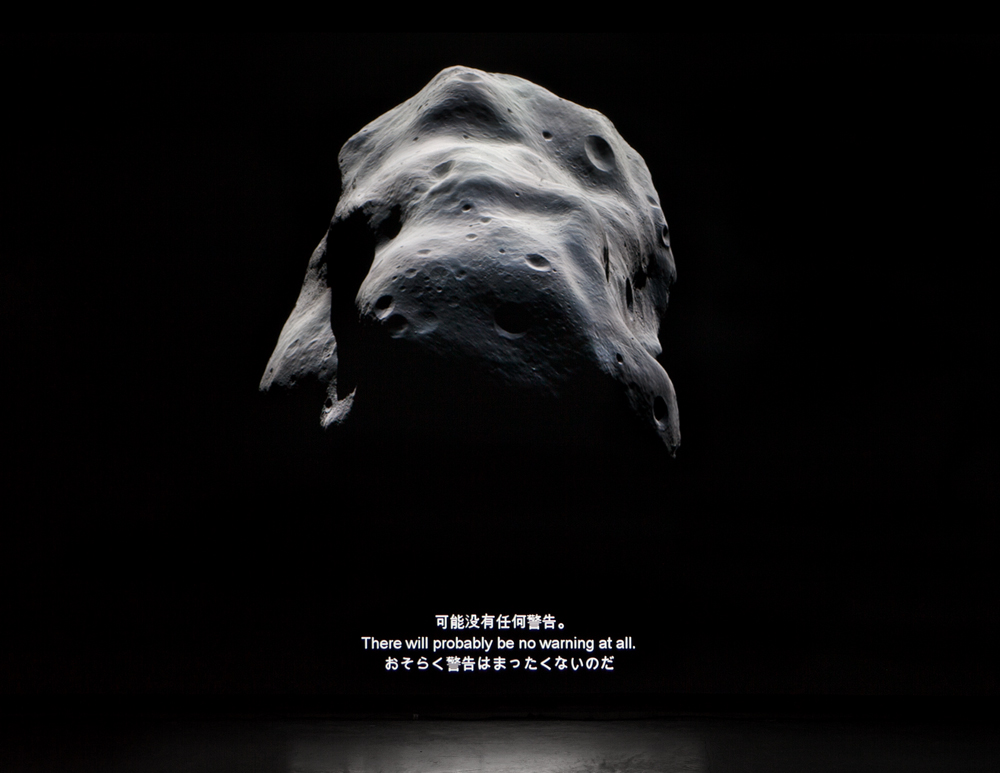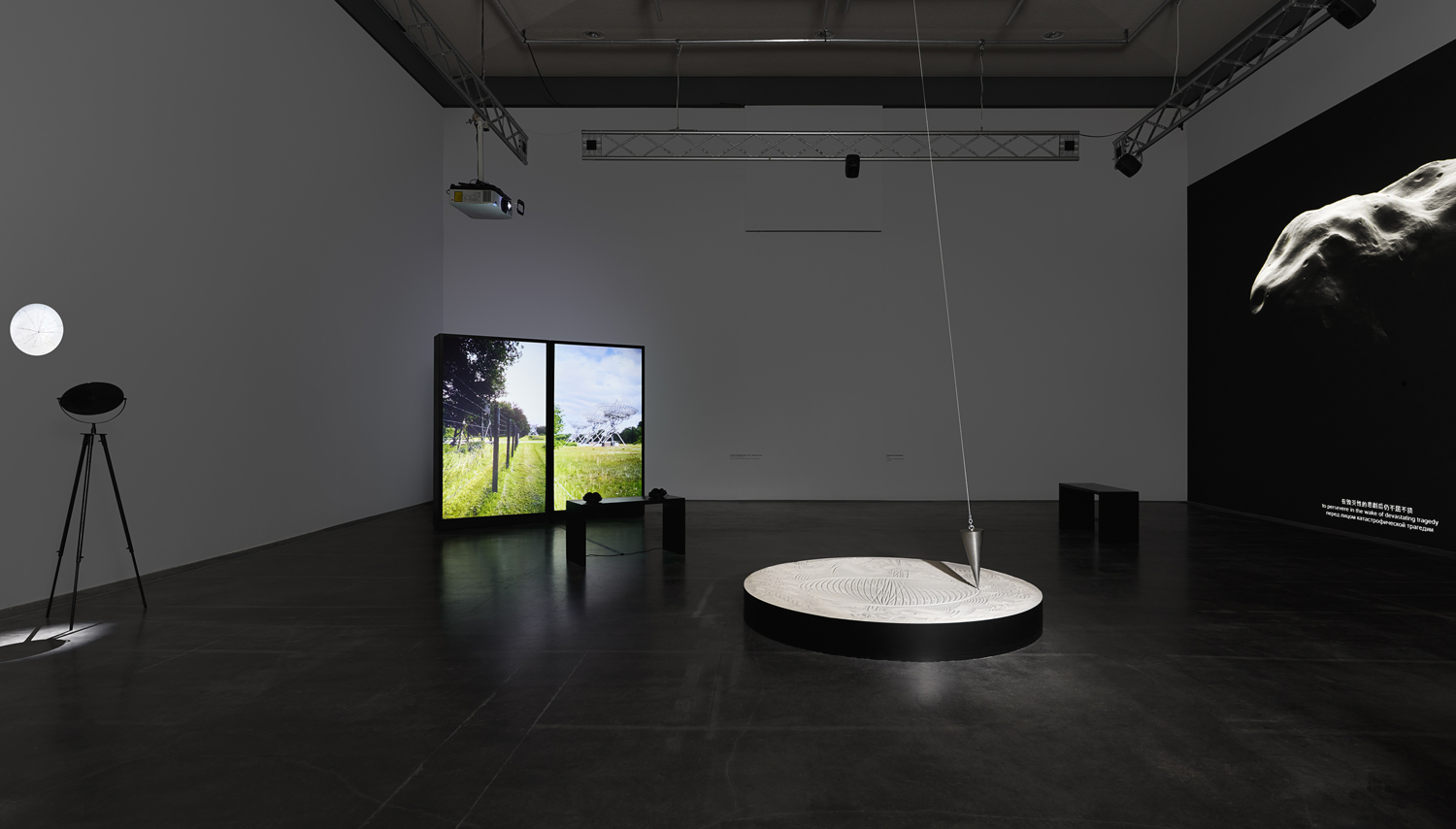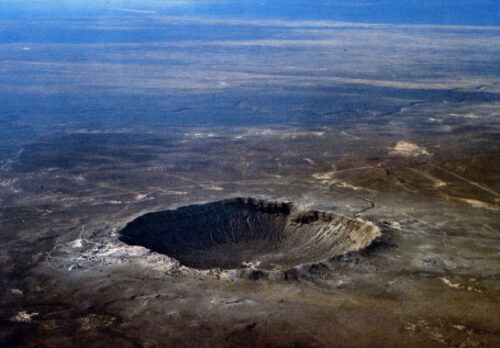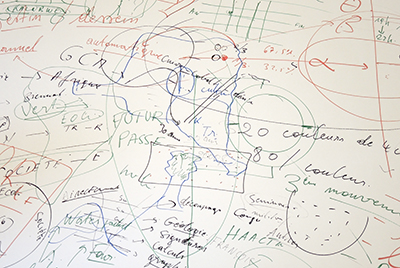Film Installation
2016
 Prospect of Interception, Installation view at Onomatopee, Eindhoven, NL (2016) Photo by Anna Dasović
Prospect of Interception, Installation view at Onomatopee, Eindhoven, NL (2016) Photo by Anna Dasović
This animation film centers around the impact or influence of a simulated asteroid on the future of life (on Earth or in space). The animation explores, amongst others, the asteroid as a potential threat or as an opportunity to escape our biosphere system; the carrier of life (panspermia) and or intelligence; or the one bringing death and extinction. Besides these topics, it orbits around an ancient fundamental human question: Are we alone?
Somehow, even though when we look into space, we can only see the light sources of the past, throughout time, we seem to associate space with the future. For instance, in astrology, the movement of celestial bodies is believed to influence the future development of life on Earth, and throughout history, flyby comets and falling stars are believed to have brought respectively disaster or opportunity.
Another more contemporary form of projecting our destiny into space evolves around the idea that space colonization is our only way out of the situation where mankind is ‘marooned’ on this planet, facing a situation where the impact of mankind on its environment and each other is irreversibly out of control. According to some, the only way for humankind to survive in the future would be to include us being out there, somewhere in space.
The film explores scenarios that propose, for instance, that living inside an asteroid will lead us to the ‘ultimate human society’ and developments in deep space mining currently being developed worldwide motivated to be an inevitable next step in the expansion of technological evolution, a solution for the future lack of resources here on earth and possible future space colonies.
The accompanying multi-lingual narrative is non-linear and associative, encouraging viewers to speculate while observing the fictional asteroid slowly turning around in space. The two-hour subtitle text is assembled from different sources by over 100 authors. Topics range from science (astronomy/astrophysics/cosmology / cognitive research) to spirituality and from various historical sources throughout time and culture, all relating to space, space exploration, celestial bodies, and the search for extraterrestrial life.
The text is translated into Chinese and English, accompanied by five other changing languages (Hindi, Arabic, Russian, Japanese, and Spanish), all predominantly spoken official world languages and relating to countries involved in important space programs, astronomical projects, SETI research, and future asteroid mining. The text often speaks in ‘the name of humanity’ conflictedly. The multiple languages enhance the suggestion of a universal voice and, at the same time, add another layer of complexity to the interpretation.
Sample – Prospect of Interception (8 min.)
 Exhibition view, Shifting Axis, Marjolijn Dijkman, photo Edith Russ Haus, Oldenburg, DE, 2021
Exhibition view, Shifting Axis, Marjolijn Dijkman, photo Edith Russ Haus, Oldenburg, DE, 2021
Commissioned by: 11th Shanghai Biennale
Curated by: Raqs Media Collective
Animation: Jeroen Koffeman
Sound composition: Ji Youn Kang
Duration: 120 minutes (HD)
Installation: HD projection on a matt black surface
Prospect of Interception is referencing thoughts and fragments compiled out of the writings of amongst others: John Allen, Celu Amberstone, Anaxagoras (510 – 428 B.C.), Svante Arrhenius (1859 – 1927), Erik Asphaug, Marc Augé, Robert W. Balch, George Bataille (1897 – 1962), Ragbir Bhathal, Peter T. Bobrowsky, Alexander Bogdanov (1873 – 1928), Niels Bohr (1885 – 1962), Rebecca Boyle, Stewart Brand, Giordano Bruno (1548 – 1600), John B. Campbell, James Carney, Lucretius Carus (99 – 55 B.C.), Von Del Chamberlain, David Chalmers, Friedrich Chladni (1756 – 1827), Rudolf Clausius (1822 – 1888), Aniel E. Clemens, Bill Clinton, Giuseppe Cocconi (1914 – 2008), Godfrey Copley (1653 – 1709), Francis Crick (1916 – 2004), David Darling, Paul Davies, Richard Dawkins, Michael Dawson, Frank Drake, René Dubos (1901 – 1982), Jerold Emhoff, Epicurus (341- 270 B.C.), Ernest Florens (1756 – 1827), Nikolai Fyodorov (1829 – 1903), Hugo de Garis, Bill Gerken, Alice Gorman, Brian Greene, Edward Harrison (1919 – 2007), Stephen Hawking, Kiyotsugu Hirayama (1874 – 1943), Jim Holt, Sir Fred Hoyle (1915 – 2001), David Hughes (1930 – 2005), James Hutton (1726 – 1797), Aldous Huxley (1894 – 1963), Chris Impey, Emmanuel Kant (1724 – 1804), Lord Kelvin (1824 – 1907), Ray Kurzweil, Stanislaw Lem (1921 – 2006), John S. Lewis, John E. Mack (1929 – 2004), Ernest L. Martin (1932 – 2002), Karl Marx (1818 – 1883), Ernst Mayr (1904 – 2005), Kim Arthur Mayyasi, Marcin Milkowski, Conway Morris, Philip Morrison (1915 – 2005), Barbara D. Moskowitz, Teng Mu (1247 – 1306), Mark Nelson, Ruth E. Norman (1900 – 1993), Nicole Oresme (1325 – 1382), Mary Oberthur, William Paley (1743 – 1805), Blaise Pascal (1623 – 1662), Larry J. Paxton, Hans Rickman, Eleanor Rosch, Carl Sagan (1934 – 1976), P. Steven Sangren, Marshall T. Savage, Dirk Schulze-Makuch, Sveltana Semenova, Michael K. Shepard, Lee Smolin, Marc Sonter, Paul D. Spudis, Donald K. Stern, Mel Tappan (1933 – 1980), Thomas F. Torrance (1913 – 2007), Total Overcomers Anonymous, K. E. Tsiolkovsky (1857 – 1935), Peter Van De Kamp (1901 – 1995), Shirley Ann Varughese, Vladimir Vernadsky (1863 – 1945), Erich Von Daniken, George Wald (1906 – 1997), Barbara Ward (1914 – 1981), Steven Weinberg, Roger W.Wescott (1925 – 2000), Walt Whitman (1819 – 1892 ), Chandra Wickramasinghe, Craig S. Womack, M. Jane Young, George Zebrowski.













